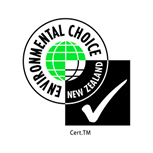
Environmental Choice New Zealand (ECNZ) is the official ecolabel of New Zealand. [1] The label is owned and endorsed by the Ministry for the Environment of the New Zealand Government. [1] The Environmental Choice programme, which started in 1992, [1] is administered by the New Zealand Ecolabelling Trust [2] on behalf of, but independently from, the Ministry for the Environment. [3] The trust and the programme are part of the Global Ecolabelling Network. [1] [2]
Contents
The label identifies products and services that meet high-quality environmental standards throughout their life cycle. [3] It is New Zealand's only ISO Type I ecolabel [1] and the country's most comprehensive and robust product-focused certification. [2] About 2000 products and services are eligible to carry the label. [4]